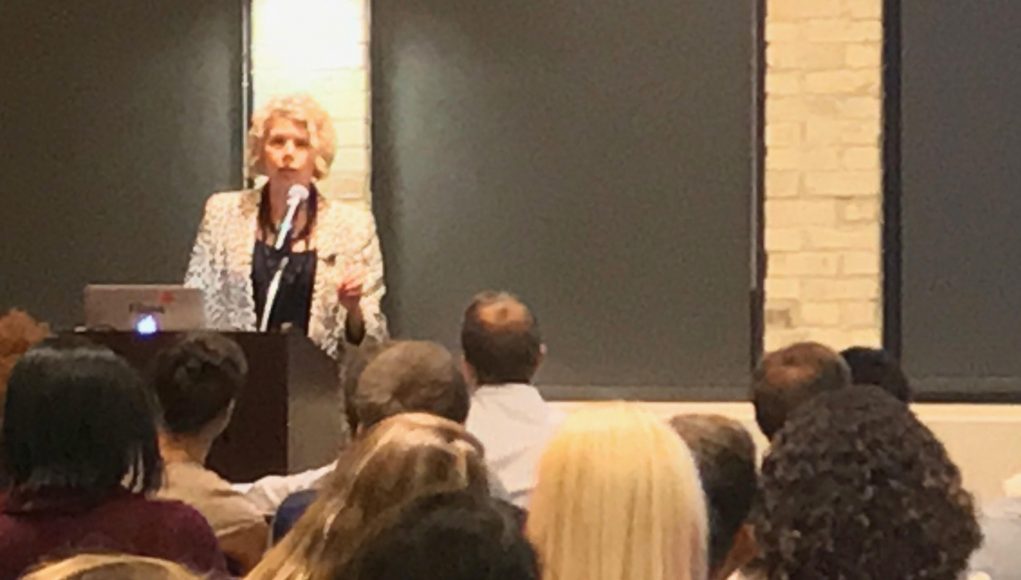Those of us of a certain age remember how it was to go into a bank as a kid. If you grew up in small town Wisconsin, or even Madison if it was long enough ago, you know what I mean.
You’d walk in the bank and marvel at all the signs and computers and tellers. If you were like me, the teller knew your name. Maybe they were the mom or dad of a school classmate. They knew your family. Knew you wanted to save up for that car when you were 16 and even how much saving you had left to do.
Lisa Servon described that scene in front of a packed audience at Goodman Center on Madison’s East side last week. For her, it was small town New Jersey. But the scene was the same. She got a pocketbook from her dad and the teller knew her by name. Back then, banking was, well, kinda fun, she told the audience.
How about now? Now you walk into a big bank and there’s no signs telling you anything or giving information you might need about, say, the fund-ravaging nature of overdraft fees. The teller definitely doesn’t care what your name is. It’s all about the big people now, according to Servon, leaving everyone else in the country behind.
The costs of banking, the pricey repercussions of overdraft fees and other fees, have left sour tastes in people’s mouths. Middle class families have been stretched the thinnest. Lisa Servon spoke at length about how difficult it is today to build and manage financial stability.
“I think it’s important because so many people these days are living in a state of chronic financial instability,” Servon said. “It’s become harder to find jobs that pay a living wage and get ahead financially. So, people are living in this very vulnerable state and at the same time the big banks are not necessarily serving people who are in that situation. There’s a lot of stigma around people who are using alternatives like check cashers and payday lenders. One of the things i tried to show in my research and my book is often times people are making rational decisions when they use those things and they just don’t have other options.”
Servon told the audience that payday lenders and check cashers outnumber the amount of Starbucks and McDonalds that there are in many low income areas. The liquidity people get from using places like a check casher often exceeds what a customer would be able to receive at a bank.
People who need the full amount of a check, for example, have to wait for that check to clear at a bank. Servon says while she was doing research for her book she noticed that even customers cashing large checks preferred to instant cash model these once taboo places provide.
“There’s a high correlation between poverty and being able these days to afford a bank,” Servon told Madison365. “The government looks at the numbers of who’s banked and who’s unbanked and their answer is to try to push everyone towards banks. But the banks are not necessarily serving people fairly and providing the affordable services the American people deserve. In fact, these same big banks that are not serving you and I very well are also the ones who pulled back on helping small businesses.
So it really is the credit unions helping people. The big banks have not demonstrated that they care that much about Main street and everyday people”
Around Madison, home ownership is 2.1 times higher for whites than it is for for blacks, which is higher than the national average. Black households in Dane County earn 3 times less than the median white household.
Servon said that people of color pay more on credit cards, mortgages and aren’t given the same financial growth opportunities. She said the average white high school graduate earns more money out of the gate than most black college graduates.
“Even today after so much legislation about fair lending and equal opportunity, we still see disparities in terms of people of color being discriminated against in all kinds of financial services. There’s discrimination in the job market, bad returns on education. You see that families of color are investing much more in education on a relative scale and getting a much lower return. When you’re living close to the edge, every dollar counts.”
Servon said one of the fastest rising entities in the country are these check cashing and payday loan institutions. She pushed back against the stigma of using them and asked why, if these places are so bad, are so many people using them?
“Three things customers value are lower cost, greater transparency and better service. How many of you have left your bank branch recently praising the service you got and rushing to tell your friends about it?”










